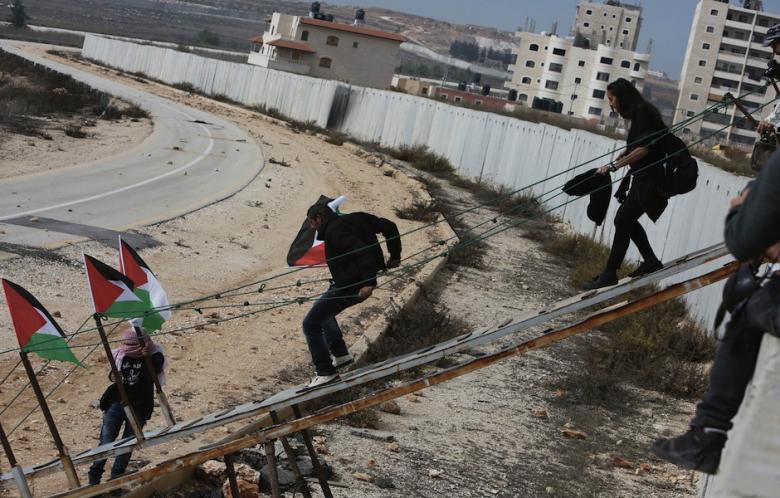Dozens of Palestinian activists crossed Israel's illegal apartheid wall in the West Bank on Friday near the Qalandiya checkpoint as part of a series of protest actions to demonstrate solidarity with Jerusalem.
Activists used makeshift ramps and ladders and cut through barbed wire to climb over the apartheid wall near Qalandiya military checkpoint, which is at least six meters in height.
The action was part of a campaign entitled #On2Jerusalem that was organized by the Popular Resistance Committees.
In the last two months, Israel announced 2,600 new settlement housing units in Givat Hamatos, 640 units in Ramat Shlomo and 400 units in Har Homa, grabbing more and more Palestinian land for Jewish settlers. In the Palestinian neighbourhood of Silwan, illegal settlers took over 25 Palestinian apartments.
Israeli settlers and the Israeli army have almost daily invaded the area. In October, at least 1,355 Zionist settlers, including the Knesset members, stormed into the al-Aqsa mosque compound without permission. Israeli political leaders regularly join the settlers to demonstrate that these invasions are part of the government strategy. Israel now routinely closes the Noble Sanctuary to Palestinians in the hours between the morning and the midday prayers, provoking further clashes. For the first time since Salahuddin liberated Jerusalem from the crusaders, Israeli occupation forces twice completely closed down the Noble Sanctuary compound, even prohibiting the call to prayer.
Coordinator of the popular committees Salah Khawaja said they attempted to enter Jerusalem but were prevented from doing so by Israeli forces, who were heavily deployed in the area.
Israeli forces used live fire, tear gas canisters, stun grenades and rubber-coated steel bullets to disperse the march.
Dozens of Palestinian activists also gathered near the village of Hizma carrying Palestinian flags and shouting slogans in support of Jerusalem.
Several youths were injured as Israeli forces opened fire at them to prevent them crossing the checkpoint. The activists managed to close the road, with Israeli forces preventing settlers from traveling to the area.
Dozens of activists also demonstrated by the entrance to the illegal Maale Adumim settlement waving Palestinian flags.
"They attempted to detain us for carrying Palestinian flags," Khawaja said. "What we did today was to emphasize that we do not have a choice but popular resistance and clashing with Israel is a part of our fight to stop Israeli crimes against Palestinians.
On Saturday, a similar incident occurred as Palestinian activists affiliated with local popular resistance committees in the villages northwest of Jerusalem broke open a hole in the apartheid wall to commemorate the 25th anniversary of the fall of the Berlin Wall.
The illegal Israeli apartheid wall is in many places more than double as high and nearly six times as long at the German barrier, as it cuts across the West Bank to divide Palestinians from other Palestinians ostensibly in order to ensure Israeli "security."
Israel began building the apartheid wall in 2002, and the route has been the target of regular demonstrations by border towns whose land is cut off by its path.
Israel has regularly confiscated large plots of Palestinian land in order to build the wall.
If the barrier is complete, 85 percent of it will have been built inside the occupied West Bank.
In 2004 the International Court of Justice ruled that the apartheid wall was illegal and "tantamount to annexation."
Critics believe the wall to be a part of “a land grab” designed to ensure that Zionist-only settlements built on occupied territory and housing around 550,000 Israelis will become a de facto part of "Israel" despite the lack of a peace agreement, securing control over confiscated land.
The roots of the Israel-Palestine conflict date back to 1917, when the British government called for "the establishment in Palestine of a national home for the Jewish people" in the now-famous Balfour Declaration.
Israel occupied East Jerusalem and the West Bank during the 1967 Middle East War. It later annexed the holy city in 1980, claiming it as the capital of the self-proclaimed Zionist state – a move never recognized by the international community. In September 2000, a visit to the site by war criminal Israeli politician Ariel Sharon sparked the "Second Intifada.

